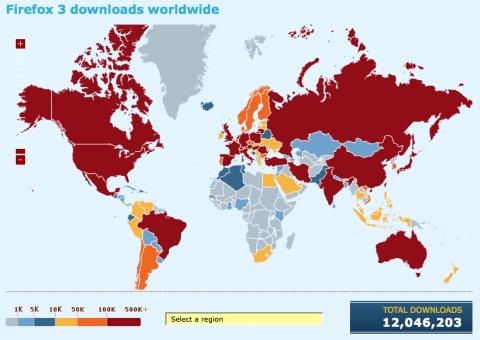
Firefox 3 Launch Sets New World Record: 8 Million Downloads in 24 Hours
This past Tuesday, Mozilla set a new world record with more than 8 million downloads in just 24 hours. Firefox 3, Mozilla's open source web browser, offers improvements to memory management, a new bookmarks system, enhanced security features, and better operating system integration for Mac users.
In the weeks leading up to Firefox's launch, Mozilla encouraged users to spread the word about Firefox and sign up to receive news and updates for Download Day 2008, on which Mozilla aimed to reach a new Guinness world record for the most software downloads in a 24 hour period. They far surpassed their goal of 5 million downloads, reaching 8.3 million despite the site going down in their first hour under high traffic loads and the download counter being reset. According to the officialMozilla Blog, their servers were distributing more than 9,000 downloads a second at one point. Guinness officials are reviewing data from Download Day 2008 and will soon officially announce whether Mozilla has set a new world record.
Mozilla claims users have contributed more than 15,000 improvements to the open source Firefox 3. For end users (you and me), the most noticeable improvements will be Firefox 3's significantly reduced memory demands, a new one-click bookmark system that allows users to sort bookmarks by tags (such as on del.icio.us), full-page zooming, and highly visible phishing and malware protection. Mac users receive an extra gift: Firefox 3 finally utilizes OS X's Cocoa API, allowing the browser to access system features previously unavailable in Firefox 2. Developers will appreciate enhanced support for web standards, new font handling, and a more extensive add-on framework.
At the time of publication, Firefox 3 has been downloaded more than 12 million times, with 3.5 million downloads in the US alone. All these downloads translate to greater presence for Mozilla in the web browser market. Firefox 3 competes on Windows against Microsoft's Internet Explorer 7 (often criticized for its security holes and quirky, proprietary rendering engine), on OS X against Apple's Safari, and on Linux machines against Opera. Of these browsers, Internet Explorer is the big boy, accounting for 54.8% of market share in April 2008, the latest month of statistics available from w3schools.com. In that same month, all versions of Firefox accounted for 39.1% of market share. In the previous year, Internet Explorer has lost 4.4% market share, while all versions of Firefox gained 6.2%. On Download Day, alone, Firefox 3's market share jumped 300% according to the Mozilla Blog. Firefox's significant growth is putting pressure on Microsoft to tighten security in its forthcoming Internet Explorer 8, and to standardize its rendering engine. In the end, this will lead to a more secure and consistent browsing experience for users, and an easier time creating sites for developers.
As open source software, the development of Firefox relies on contributions by thousands of volunteer software developers, beta testers and graphic designers. Unlike proprietary browsers such as Internet Explorer or Safari, which are owned and controlled by Microsoft and Apple, respectively, the future of Firefox is decided by its user and developer base. Likewise, unlike Internet Explorer or Safari, Firefox is not installed by default on Windows or Mac OS X systems so its success can be largely attributed to word of mouth. Firefox users recognize the browser's security advantages and its more accurate web page rendering (openmediaboston.org looks best in Firefox), and encourage friends to install it. If you've never experienced Firefox, then you're only seeing half of the Internet's potential.


Comments
Hello,
Your article states:
"Of these browsers, Internet Explorer is the big boy, accounting for 54.8% of market share in April 2008, the latest month of statistics available from W3C."
However, you link to w3schools.com, an organization unaffiliated
with the World Wide Web Consortium (W3C).
I welcome a correction to your post. Thank you,
Ian Jacobs, Head of W3C Communications
http://www.w3.org/
Ian, thank you for reading and your correction. I was unaware the two organizations were unrelated. I've made the correction in the article.